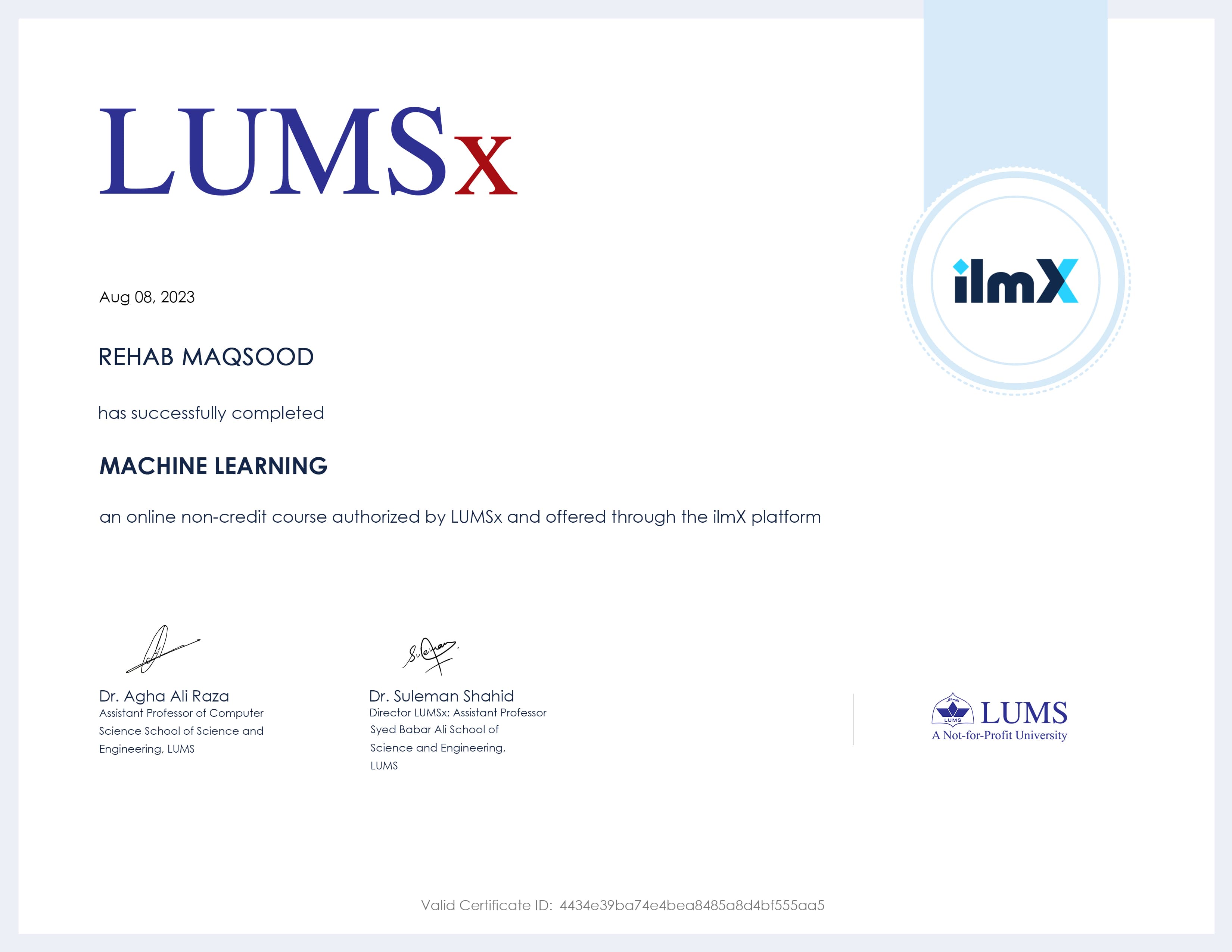LUMSx
LUMSx is the center for online learning and professional development at LUMS. It extends LUMS’ excellence in teaching and research beyond its borders by leveraging technology and innovative pedagogy.
If you’re having problems with the platform, you can reach out to our IT support team through the live chat.

Are you intrigued by the world of Artificial Intelligence (AI) and wish to learn about the fascinating field of Machine Learning (ML)? With applications ranging from self-driving cars to voice assistants and large language models, Machine Learning is revolutionizing the way we interact with the world at a fast-evolving pace.
Whether you are a data expert, a student of computer science or engineering, a freelancer or just someone who wishes to learn about Machine Learning, then this course is for you!
This machine learning course strikes the right balance between both theory and real-world applications of Machine Learning. The course also explores ethical dilemmas around the use of AI and how Machine Learning can be utilized for social good. Given the local context, the videos use a mix of English and Urdu to create a more accessible learning environment.
If you are looking to expand your skill set, apply for graduate school, progress in your career, or unlock better freelance opportunities, then this is the best machine learning course online that will equip you with the necessary knowledge needed to step into the exciting world of Machine Learning.
To take this course, you need to know at least one programming language (Python, R, C or C++, SQL or any other) and be familiar with foundational concepts of Probability, Statistics, and Linear Algebra.
Course Objective: Ignite enthusiasm for Machine Learning and equip learners with the foundational skills to harness its potential.
By the end of this machine learning course, learners will be able to:

LUMSx is the center for online learning and professional development at LUMS. It extends LUMS’ excellence in teaching and research beyond its borders by leveraging technology and innovative pedagogy.

Welcome to the course on Machine Learning! In this module you will learn about what Machine Learning is? Who is this course for? What this course contains and how will you be able to benefit from this course. This introductory module will give you information on the instructor’s profile, course syllabus and objectives, different features of the course, grading policies, expectations around academic honesty, frequently asked questions, and a chance to chat with your peers.
This module will uncover the wonderful world of machine learning, demonstrating its ubiquity in our lives and explaining its underlying concepts. Through a mix of theory and examples, this module will give you a comprehensive understanding of machine learning's key concepts, historical background, applications, challenges and how it can be harnessed for social good. The module will also give you an opportunity to learn the basics of python and apply them through a programming assessment.
Supervised learning is one of the fundamental techniques in Machine Learning. This module will equip you with the foundational knowledge and practical skills necessary to apply supervised learning algorithms to real-world problems. Through a combination of theoretical concepts and hands-on exercises, you will gain a solid understanding of the principles, algorithms, and evaluation methods involved in supervised learning.
K-NN is a non-parametric method used for both classification and regression tasks. This module will familiarize you with the underlying principles, implementation, and evaluation of the K-NN algorithm. Through theoretical explanations and practical examples, you will gain proficiency in applying K-NN to real-world problems, selecting an appropriate value for K, handling distance metrics, dealing with imbalanced data, and optimizing model performance.
The module provides a comprehensive understanding of essential evaluation metrics for classification tasks. You will begin with learning about accuracy, build up to precision, recall, and F1-score, which are widely used performance measures that assess the effectiveness of classifiers in predicting class labels. This module will equip you with the knowledge and skills to calculate and interpret these metrics accurately. You will gain a solid understanding of the concepts behind precision (the proportion of correctly predicted positive instances), recall (the proportion of actual positive instances correctly predicted), and F1-score (a harmonic mean of precision and recall). Through practical examples and exercises, you will learn how to apply these metrics to assess classifier performance and make informed decisions based on their results
In this module, you will gain a comprehensive understanding of linear regression, a widely-used technique in predictive modeling. You will learn the fundamental principles and assumptions of linear regression, including linearity and independence. The module will also focus on parameter estimation, coefficient interpretation, and prediction. Additionally, important topics like regularization techniques will be explored. Through hands-on exercises and real-world datasets, you will develop practical skills in building, evaluating, and improving linear regression models, enabling you to analyze data, make accurate predictions, and extract valuable insights.
Logistic regression is a powerful tool used to predict the probability of a binary outcome based on a set of input variables. In this module you will cover the underlying concepts and assumptions of logistic regression, including the logistic function and loss function. You will also explore the process of model fitting, parameter estimation, and interpretation of results. Practical examples and hands-on exercises are included to enhance your understanding and application of logistic regression in real-world scenarios. By the end of the module, you will have a solid foundation in logistic regression and you will be equipped to utilize this technique for predictive modeling and decision-making tasks.
The module on Neural Networks provides you with an introduction to this powerful machine learning technique that mimics the structure and functioning of the human brain. Neural networks are composed of interconnected nodes, or artificial neurons, organized in layers that process and transform data. Here you will cover the fundamental concepts and components of neural networks, including activation functions, weight initialization, forward and backward propagation, and gradient descent optimization.
The module on Support Vector Machines (SVM) offers an introduction to this powerful supervised learning algorithm used for classification and regression tasks. SVMs aim to find the optimal hyperplane that separates data points of different classes with the largest margin. In this module you will learn about the underlying principles of SVM, including the concept of support vectors, kernel functions, and the margin optimization objective. You will explore both linear and nonlinear SVMs, highlighting their strengths and limitations.
This module provides you with an introduction to Bayes Theorem, a fundamental concept in probability theory and statistics. Bayes Theorem allows us to update our beliefs about the probability of an event based on new evidence or information. The content sheds light on the core components of Bayes Theorem, including prior probabilities, likelihoods, and posterior probabilities. It also explores how Bayes Theorem can be applied to various scenarios, such as medical diagnostics and spam filtering.
This module introduces the Naive Bayes classifier, a simple yet effective probabilistic algorithm used for classification tasks. The Naive Bayes classifier is based on Bayes' theorem and makes the assumption of independence among features. Here, you will cover the key concepts and workings of the Naive Bayes classifier, including the calculation of prior probabilities, likelihoods, and posterior probabilities.
This module aims to unveil the 'black box' nature of artificial intelligence and machine learning models, enabling deeper understanding of their inner workings and addressing the multifaceted issues related to AI ethics, fairness and explainability. It covers fairness in AI, interpretability of ML models, sources of bias and techniques to mitigate bias. The module also touches upon ethics in AI to understand the moral principles guiding AI development and its use. Lastly, the content covers machine learning for development, explaining how ML techniques can be used to address social and economic challenges in developing countries.
Upon completion of the course, you receive a signed certificate from the institute. You can share this certificate in the certifications section of your LinkedIn profile, on printed resumes, CVs, or other documents.

Instalment Plan with KalPay Taleem
ilmX has partnered with KalPay Taleem to provide learners with an easy instalment payment option. If you'd like to avail this facility, simply follow these steps:
For more information or assistance, you can reach out to the KalPay Taleem team at taleem@kalpayfinancials.com or call 0328-3044414.
Student Discount
If you are a student then you can avail 15% discount on this course. if a discount is already running on the course then this discount will be applied on the discounted course price.
Note: You can avail this discount even if you have opted for instalment payment method. This discount is not offered during Pre-launch Sale.
LUMS Staff Discount
If you are a member of the LUMS staff you can avail 10% discount on this course. if a discount is already running on the course then this discount will be applied on the discounted course price.
Note: You can avail this discount even if you have opted for instalment payment method. This discount is offered during Pre-launch Sale.
This course is self-paced, allowing you to learn at your own convenience. However, there are certain components that allow you to interact with your peers through the discussion forums and peer grading on programming assessments. To allow you and your peers to progress through the course without extensive delays, it is recommended that you give timely feedback to your peers on the programming assessments.